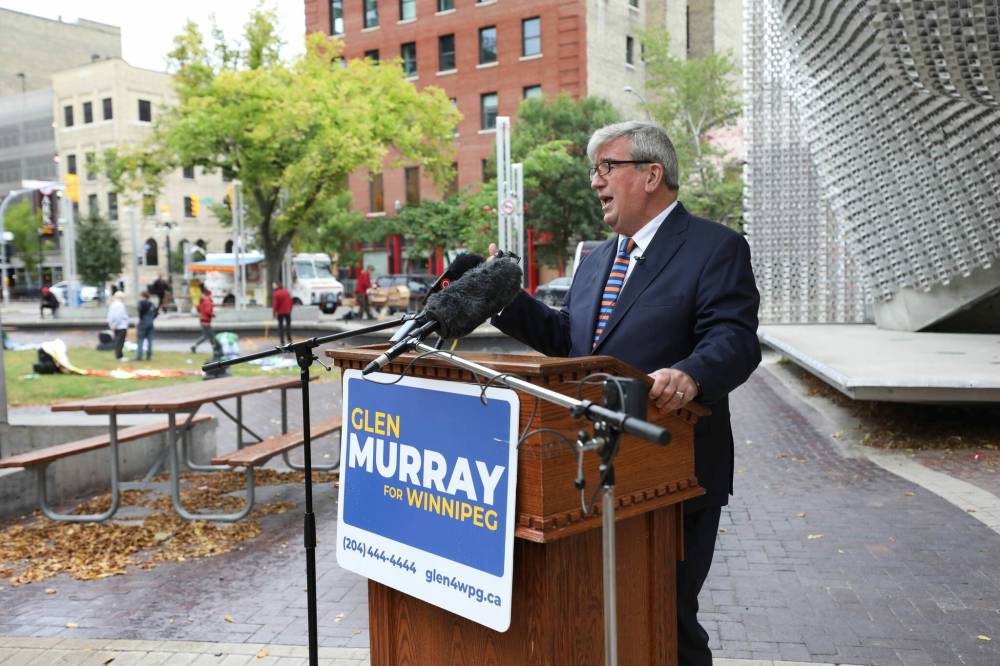Murray commits to city tree canopy
Advertisement
Read this article for free:
or
Already have an account? Log in here »
To continue reading, please subscribe:
Monthly Digital Subscription
$0 for the first 4 weeks*
- Enjoy unlimited reading on winnipegfreepress.com
- Read the E-Edition, our digital replica newspaper
- Access News Break, our award-winning app
- Play interactive puzzles
*No charge for 4 weeks then price increases to the regular rate of $19.00 plus GST every four weeks. Offer available to new and qualified returning subscribers only. Cancel any time.
Monthly Digital Subscription
$4.75/week*
- Enjoy unlimited reading on winnipegfreepress.com
- Read the E-Edition, our digital replica newspaper
- Access News Break, our award-winning app
- Play interactive puzzles
*Billed as $19 plus GST every four weeks. Cancel any time.
To continue reading, please subscribe:
Add Free Press access to your Brandon Sun subscription for only an additional
$1 for the first 4 weeks*
*Your next subscription payment will increase by $1.00 and you will be charged $16.99 plus GST for four weeks. After four weeks, your payment will increase to $23.99 plus GST every four weeks.
Read unlimited articles for free today:
or
Already have an account? Log in here »
Hey there, time traveller!
This article was published 05/10/2022 (1160 days ago), so information in it may no longer be current.
Mayoral candidate Glen Murray is proposing a new “natural capital budget” for Winnipeg to enhance the city’s tree canopy.
Trees should be seen as essential infrastructure that is being lost at an alarming rate, he said Wednesday.
“As you can see behind me, we have lost many of the trees on our boulevards, which have died off… many of (the) smaller ones are marked for removal,” said Murray, during a news conference at the tree-lined boulevard on Broadway. “Trees must be treated as our most important urban infrastructure, as the best way to fight climate change and improve urban livability.”

Glen Murray wants to sell carbon offsets and credits and obtain funding from foundations and social-impact investment funds to help enhance the city’s tree canopy. (Ruth Bonneville / Winnipeg Free Press files)
The mayoral hopeful expects to sell carbon offsets and credits and obtain funding from foundations and social-impact investment funds to help cover the cost of his pledge.
He also promised to commit an unspecified portion of every dollar allocated to concrete- and pavement-based construction projects to the natural budget. Boulevard trees would be required as part of “complete streets” moving forward.
The plan would also allow residents and businesses to vote to designate their neighbourhoods as tree-restoration zones, where a levy would be added for five years to fund forest assessment plans and pilot restoration projects. Murray didn’t specify the size of a possible levy, but stressed the plan revolves around finding new revenue, not increasing property taxes.
“We will be building the tax base, not the tax burden on citizens and businesses,” he said.
The amount of capital funding devoted to trees would depend on how much new construction the City of Winnipeg pursues and the amount of carbon offsets, Murray said.
He also promised to develop a national coalition of Canadian cities to fund urban forestry, plant at least two new trees for every public tree lost, ensure public trees are pruned every seven years and require trees be protected during construction projects.
Following the news conference, reporters asked Murray about recent allegations he sexually harassed staff and exhibited “chaotic” behaviour during his work at the Pembina Institute in 2017-18. Murray has denied the harassment allegations and said his leadership style just wasn’t a good fit for the Alberta organization.
He declined to answer some questions on the topic Wednesday; however, he stressed he has already proven his ability to lead the city while he served as Winnipeg’s mayor from 1998 to 2004.
“Most Winnipeggers know me very well, and they know me as someone who is respectful and an agent of significant change,” he said.
Since the allegations, some past colleagues have reached out to the Free Press to defend Murray against the claims.
Ouellette takes aim at addictions
Mayoral contender Robert-Falcon Ouellette unveiled his plan to address the addictions crisis.
Ouellette said he would have the city set up a supervised drug consumption site, whether the province supports the idea or not.
“We’re the ones closest to the issues facing the city and the city has a responsibility to actually do something,” he said.
He would increase access to prescribed pharmaceutical alternatives, which could include safer versions of illicit drugs and medicines that treat addiction withdrawal, ensure more immediate access to addictions treatment, and boost supports that follow addictions treatment (such as housing and skills training), he said.
He promised to work with other governments to ensure First Nations, Inuit and Métis people can access treatment.
While he did not have a price estimate for the promises, the candidate said he expects funding from private entities, the federal government and foundations could help implement the changes.
“This is a health-care crisis that we’re really suffering at the City of Winnipeg. If the province doesn’t want to work with us, then we might have to go it alone,” said Ouellette.
Winnipeggers will elect their next mayor and council on Oct. 26.
joyanne.pursaga@freepress.mb.ca
Twitter: @joyanne_pursaga

Born and raised in Winnipeg, Joyanne loves to tell the stories of this city, especially when politics is involved. Joyanne became the city hall reporter for the Winnipeg Free Press in early 2020.
Our newsroom depends on a growing audience of readers to power our journalism. If you are not a paid reader, please consider becoming a subscriber.
Our newsroom depends on its audience of readers to power our journalism. Thank you for your support.



